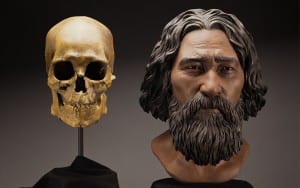Live Science
Originally Posted: June 18, 2015

The relatives of a much-debated 8,500-year-old skeleton found in Kennewick, Washington, have been pinned down: The middle-age man was most closely related to modern-day Native Americans, DNA from his hand reveals.
The new analysis lays to rest wilder theories about the ancestry of the ancient American, dubbed Kennewick Man, said study co-author Eske Willerslev, an evolutionary biologist at the Natural History Museum of Denmark at the University of Copenhagen.
“There have been different theories, different mythology, everything from him being related to Polynesians, to Europeans, to [indigenous people] from Japan,” Willerslev told Live Science. “He is most closely related to contemporary Native Americans.”
A couple first discovered the skeleton in 1996 on the banks of the Columbia River in Kennewick. The coroner analyzing the remains noticed an arrow tip lodged in the man’s pelvis, and surmised he was a European felled by a Native American, said co-author David Meltzer, an anthropologist at Southern Methodist University in Dallas.
But the man’s bones revealed he was at least 8,000 years old.
At a news conference then, researchers studying the skeleton said the ancient man was “Caucasoid,” an archaic, 19th-century term that includes a wide swath of people with origins in Africa, Western Asia and Europe. Reporters heard the word “Caucasian,” and all of a sudden people were wondering how a European showed up in North America and was shot thousands of years before Europeans set foot on the continent, Meltzer said. READ MORE